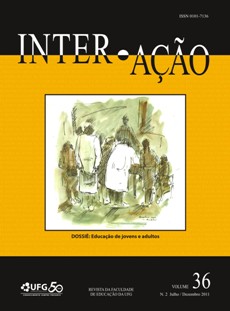YOUTH EDUCATION AND ADULT AND RURAL EDUCATION: PUBLIC POLICIES AND THE MEANING OF THE RIGHT TO EDUCATION
DOI:
https://doi.org/10.5216/ia.v36i2.16714Keywords:
Educação de jovens e adultos, Educação do campo, Políticas públicasAbstract
As an ongoing research this study aims to explore the relationship between youth education and adult and rural education, as fields of knowledge under construction, and struggles which are part of the lives of youth and adult workers, who have been denied their right to education. This case study analyses the Espírito Santo State experience of the Projovem Campo Saberes da Terra Program, through the study of official documents, data from field observations, and onsite focus group interviews with students and educators participating in 14 class groups from the Program. As its theoretical framework, it uses historical resources, law and studies which problematize the paths, concepts and advances in rural and youth and adult education in order to build public policies. As a result of the study the challenges for putting into practice a policy for rural education, aimed at young and adult rural workers, are indicated.Downloads
Downloads
Published
How to Cite
Issue
Section
License
Inter-Ação uses the Creative Commons Attribution 4.0 License for Open Access Journals (Open Archives Initiative - OAI) as the basis for the transfer of rights. Open access means making documents available on the Internet free of charge, so that users can read, download, copy, distribute, print, search, or link to the full text of documents, process them for indexing, use them as input data for software programs, or use them for any other lawful purpose, without financial, legal, or technical barriers.
Authors publishing in this journal agree to the following conditions:
1) Authors retain copyright and grant the journal the right of first publication, with the work simultaneously licensed under the Creative Commons Attribution License, which permits redistribution of the work with attribution and first publication in this journal.
2) Authors are permitted to enter into additional, separate agreements for non-exclusive distribution of the version of the work published in this journal (e.g., for publication in an institutional repository or as a book chapter), with attribution and first publication in this journal.
3) Authors are permitted and encouraged to publish and distribute their work online (e.g. in institutional repositories or on their home page) at any time before or during the editorial process, as this may generate productive changes as well as increase the impact and citation of the published work.















